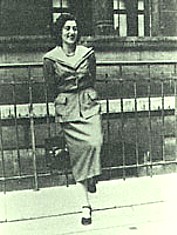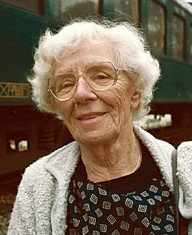Main Text (back
to top)
Within the Nazi Regime an effort was made to control all aspects of life
in the Third Reich. Men were expected, and typically forced into the Army,
children had to join the Hitler Youth in order to be integrated more fully
into the goals and ideologies of the Third Reich, and women were given
strict roles to adhere to that would enable them to further the cause
of Nazi Germany. In fact, women and their roles were seen as the backbone
of German society. From the beginning, the spheres that women were expected
to attend to were emphasized not only through propaganda, but also through
speeches and laws that were passed. As stated by Brana Gurewitsch in her
book Mothers, Sisters, Resisters, women occasionally "benefited
from the stereotypes perpetuated by Nazi ideology…The persistence of the
stereotype of the passive, homebound woman dominated by her husband prevented
Germans from immediately suspecting women of activities that did not fit
this stereotype." The strict gender roles that the Nazis imposed
acted as a shield and disguise under which women resistors could work.
Two such women resistors that I will examine are Lucie Aubrac and Diet
Eman. Although in different countries and working with different groups
of resistance, both Lucie and Diet utilized the stereotypes of women propagated
by Nazi Germany to move within their resistance efforts. Cases such as
theirs exemplify how women were able to use the gender roles assigned
to them by the Third Reich in order to work against the Nazis.
German women, and women within the influence of Germany, were expected
to attend to the home. It was taught that women should build a stronger
and more united Germany through raising children and serving their husbands.
For this reason, many women were fired from their jobs, not allowed to
work in government or hold office, and looked down upon if they were single
or did not raise enough children. Joseph Goebbels, the State Minister
for People's Enlightenment and Propaganda explained the woman’s role in
a speech during the exhibit "Women" in Berlin in 1935 as "something
quite different from the vocation men have." He goes on to describe
that a woman's "first and foremost place is in the family, and the
most wonderful duty which she can take on is to give her country and her
people children, children which carry on the success of the race and assure
the immortality of the nation."
This emphasis on the rearing of children is present throughout German
propaganda and programs. In fact, Germany was so intent on consigning
women to be solely mothers and homemakers that an organization called
"Lebensborn" or "Fountain of Life" was set up in 1935
under the direction of Heinrich Himmler. Here, women who were seen as
"racially fit" were provided to procreate with the purest of
SS men. In this way, those who were single and unwed were still able to
contribute to the advancement of "pure" German subjects.
Although many see these strict gender roles as a degrading act upon women,
one which weakened their abilities to be heard and recognized, often women
acting under the guise of the expectations of their gender were able to
resist the Nazi Regime. Because men, and particularly those men indoctrinated
with Nazi propaganda and ideals, saw women as weak and unable to be beneficial
in any other area than child raising, women were often able to go undetected
in working in resistance against the Third Reich. Women used the stereotypes
placed upon them to create a seemingly innocent and benign alibi while
actually participating in activities directed toward the destruction of
Hitler and his Third Reich.
A poignant example of a woman resistor using the expectations that were
placed on her as a woman is that of Lucie Aubrac, a member of the French
Resistance during a Nazi-occupied France. Her memoir, Outwitting the
Gestapo, written in the form of a journal, describes her actions in
resisting the Nazis. In the beginning, Lucie is a supporting member for
her husband, who is deeply involved in the Resistance. She uses her appearance
of motherhood to cover up for secret meetings between her husband and
other members of the Resistance. She strolls alongside them, thinking
"a mother with a child, what could be more transparently innocent
in a public park on a Sunday afternoon?" She was "happy to provide
some slight cover for [the] meeting between the two resistants."
In using her role as a mother, Lucie was able to distract the attention
away from her husband and his partner. By emphasizing her duty as a wife,
raising children, and acting under the responsibilities that are seen
fit for a woman, Lucie draws
attention away from the true task at hand and thus aids the resistance
effort.
Later in the book, when Lucie's husband is discovered and arrested by
the Gestapo for his resistance activities, she takes on the main role
and her resistance efforts are not done merely as a help to her husband,
but she takes on new tasks. However, even though she is now participating
on a main level, she still uses her role as a subservient woman and mother
to accomplish her aims. In an effort to get her husband out of jail, she
once again puts on the portrayal of a helpless woman. Pretending to be
pregnant and using the social taboo of a pregnant, unmarried woman, she
claims that she needs to see her husband, who the guards do not know that
she is married to, in order to get him to marry her, as she is expecting
his child. She acts defenseless and begs the Gestapo to let her husband
go because she "is expecting a child" and does not want "to
be an unwed mother." The Gestapo merely see her plight as one of
an ordinary woman who was deceived by a man. Because of her gender, they
do not look any more into her interest in the release of a prisoner who
poses such a threat to German control. Most certainly had it been a man
enquiring about the fate of Lucie's husband, he too would have been immediately
suspected.
In her efforts in working against the Gestapo, Lucie, unlike many of
the male characters in the novel does not use force or strength to resist,
but rather the roles that are assigned to her as a woman. Because of the
enforcement and focus of these roles, she is not seen as a threat, but
is able to perform her duties using Nazi ideas on gender to her advantage.
Yet another example of a woman using the strict confines of gender roles
to resist the Nazis is that of Diet Eman. In her memoir "Things
We Couldn't Say" she details how she used the preconceived notions
of women that Nazis propagated to her advantage. Working with the Resistance
in Holland, Diet hid Jews, downed English pilots and other peoples considered
"enemies" to the German State. Just as in the case of Lucie
Aubrac, Diet first becomes involved with Resistance through her soon-to-be
husband, Hein. However, she soon learns the limits that she, as a woman,
is most successfully able to operate within. While working for men who
were involved in espionage for the Underground and the Allies, she was
given the task of delivering forged identification documents, ration cards
and money. She notes that "for the men, the kind of travelling [she]
did would have been much more dangerous, but for women it was not so.
As a rule, Germans would not stop girls and start searching them"
(168). This was because, to most Germans, women were not seen as capable
of carrying out such tasks. To them, a women's place was in the home,
and it was inconceivable for them to imagine any who would take on other
tasks, especially those that involved such danger.
Another way that Diet was able to work within gender expectations was
by portraying herself as less intelligent than she really was. Because
women were seen as inferior by Nazis and such propaganda as they provided,
it was assumed that women were inherently less smart than men. On one
occasion, when Diet is arrested by the Gestapo for having a fake identification,
she decides that the best way to save herself is to be "really dumb"
and not "have the slightest idea how [she] could have received a
bad ID" (188). When called in for her hearing, she plays the part
of a simple maid, a profession that German men would not be surprised
at women having. During her whole hearing she remembers that she played
"the scared, stupid maid because [she] thought it was her only hope"
(274). It was in fact this impersonation of a dumb maid that saved her
life. The Nazis who where trying her merely assumed that due to the fact
she was a woman, it was sensible that she would have such a character.
Just as with Lucie Aubrac, Diet Eman, though in a different country and
working against group of Nazis, was able to use gender roles to her advantage
to help her resist against the German occupation. Both these women were
able to bend and exploit the strict ideas that were assigned to women
by the Nazis in order to work against them.
|

